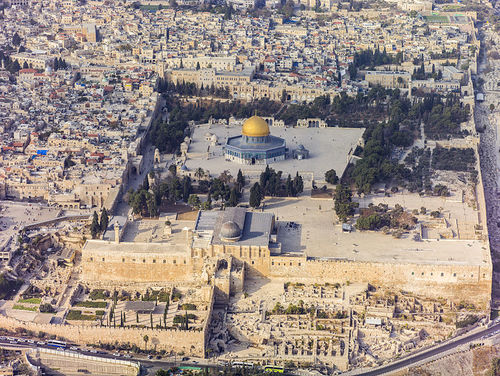
Temple Mount. Photo: Wikimedia Commons. Rami G. Khouri is about as moderate a Palestinian commentator as you can find. He is Christian, recognizes that the Temple Mount is holy to Jews, and is willing to blame Arabs for their mistakes.
Thanks to our friend Elder of Ziyon and the Algemeiner News Service
Rami G. Khouri
Even so, he justifies the recent spike in Arab terror:
The absence of PA forces under the control of President Mahmoud Abbas also means that those forces cannot quell Palestinian demonstrations against Israel, as happens in all other parts of the West Bank, where PA forces more often than not act to defend Israel as much as to keep peace among Palestinians, unfortunately. Arab Jerusalemites are essentially ungoverned and unrepresented politically, because they do not fall under Palestinian authority and they are underserved by an Israeli state that also keeps building new settlements on lands surrounding the holy city. Because of this condition of living in a political vacuum, Palestinians in Jerusalem have only themselves to rely on to defend their lands and rights, and in cases of extreme threats and violence used against them, they resort to violence such as we are witnessing these days.
Then he says something interesting:
The intense symbolism of Jerusalem for Palestinians includes two dimensions: the holy sites of the Noble Sanctuary, especially the Dome of the Rock and Al Aqsa Mosque, but also the city as the capital of Palestine, even though a Palestinian state does not exist yet. If Jerusalem is allowed to fall to Zionist colonialism and become fully Judaized, the entire Palestinian national cause would have been dealt a fatal blow. Jerusalem has always been a central battle in the Arab war with Zionism — but for many Palestinians it is now also the last battle.
The PLO covenants of 1964 and 1968 did not mention Jerusalem once. The Palestinian National Charter of 1968 likewise does not mention Jerusalem a single time. (Fatah’s charter does mention Jerusalem once.)
If Jerusalem has always been so central to Palestinian Arab nationalism, then why was it ignored for so long?
The interest that Arabs altogether, and Palestinians in particular, have shown in Jerusalem has been proportional to the interest that Jews have to assert their national and religious rights in their ancient capital. Between 1948 and 1967, Jerusalem was an unimportant Jordanian city, and there were no mass pilgrimages there. Only when Jews started to say that Jerusalem was theirs, and always has been, have the Arabs decided that it is supremely important for them too.
And this spills over even into the writings of a “moderate.”
The fact is that if Palestinian nationalism cannot survive without Jerusalem, then it is an artificial construct to begin with. The nearly exclusive use of the Dome of the Rock as the constant backdrop for Palestinian press conferences is a relatively recent phenomenon.
They don’t want Jerusalem – they want to ensure that Jews do not have Jerusalem. Because they know that Israel without Jerusalem is just a secular state, and they can deal with a secular state, because such states come and go. They cannot deal with a proud Jewish state that asserts rights that go back to before Islam existed.
Khouri has subconsciously revealed the shallowness of the Palestinian national cause. If it was about rights, or refugees, or land, or even “justice,” then they could have a state. But it isn’t about any of those. It is about the symbolism of controlling Jerusalem. And the only reason that this is so important is because of the Arab honor/shame society that cannot stomach the weak, dhimmi Jews asserting rights on land that everyone knows they have been tied to for thousands of years. The minute they give up on Jerusalem, they give up on the goal of expelling Jews from political power in the Middle East.
Rami G. Khouri









